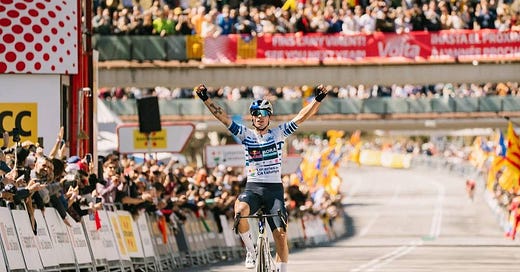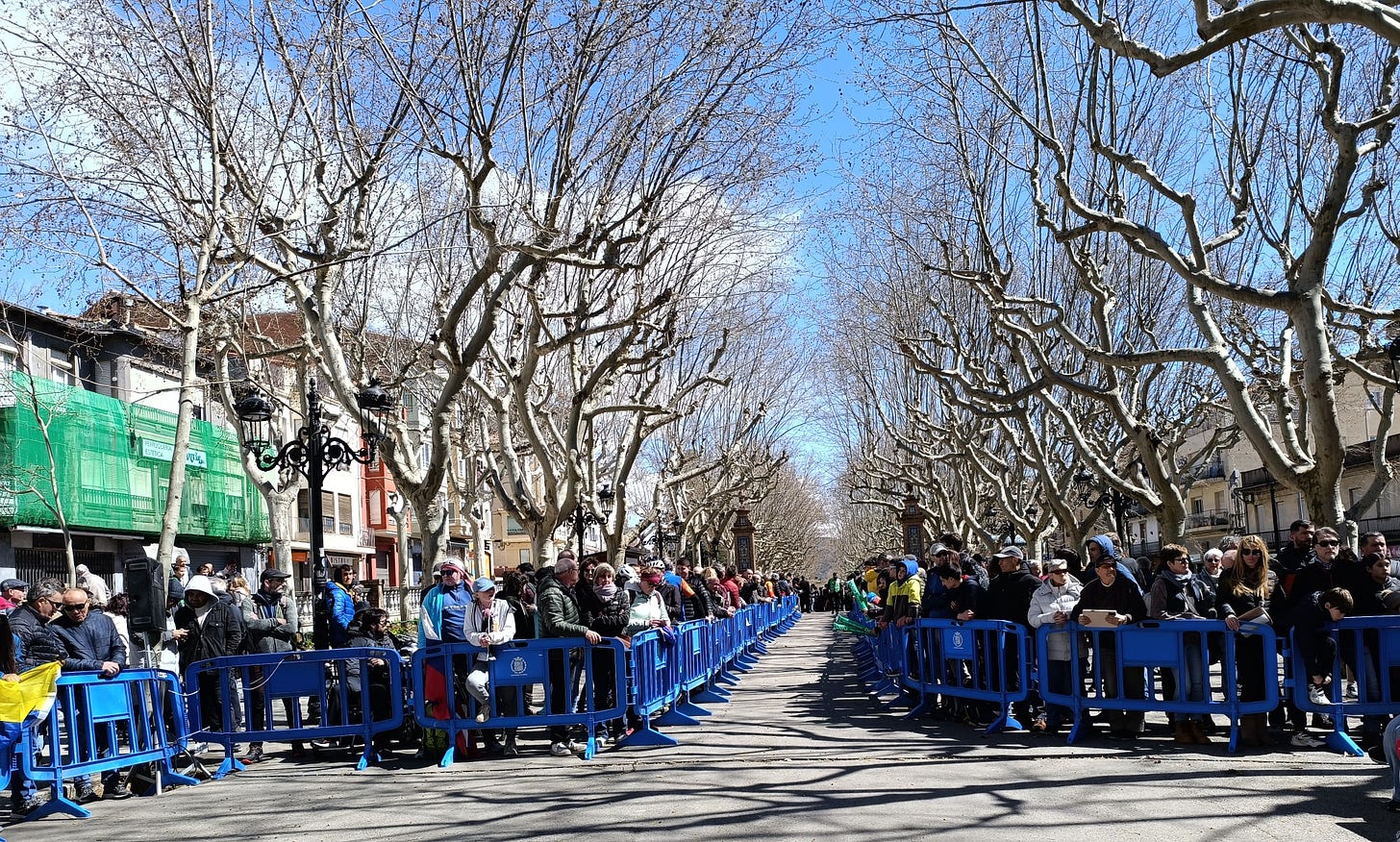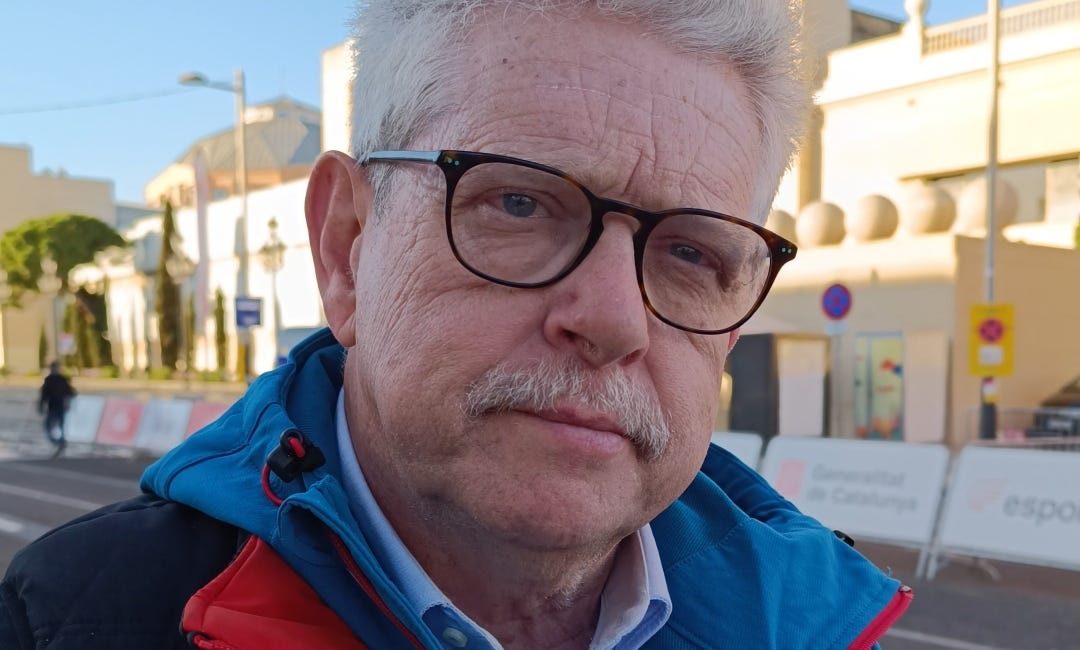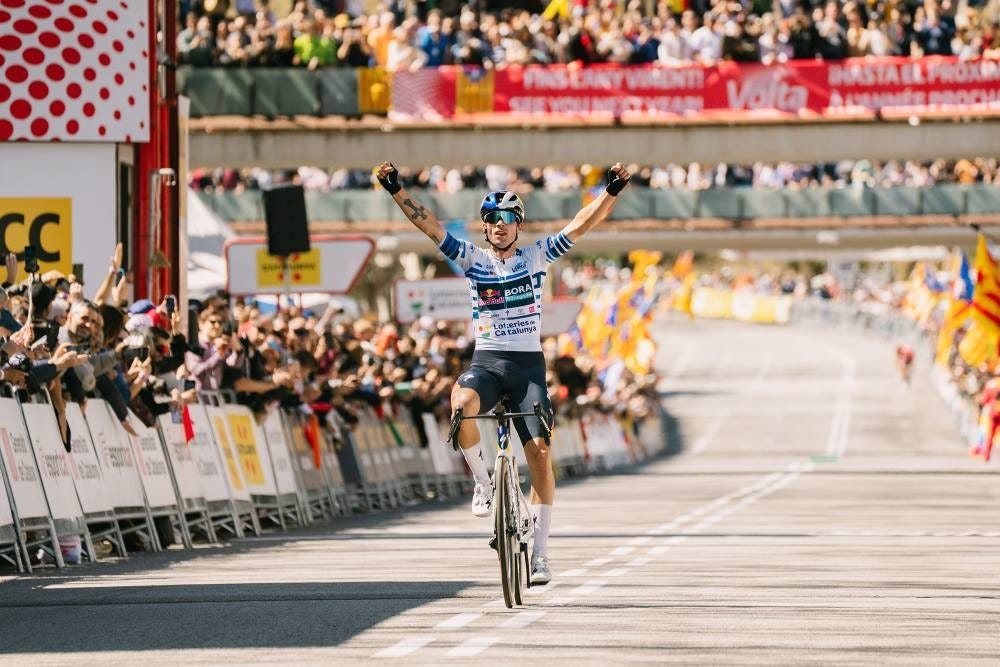Fishing in the chaos of Volta a Catalunya
Roglič takes the Volta with brilliance over Ayuso | The queen stage at Queralt turns into a stage without climbs due to the wind, sparking a new clash between organisers and riders.
On Friday, I attended the start of the fifth stage of the Volta a Catalunya in Paüls to cover the final three stages of the centenary Catalan race. I didn’t know yet that the wind would ruin the queen stage, but I did see how it threatened the stage finishing in Amposta, which was eventually won by Matthew Brennan.
Fun fact: On my way to the rider presentation, I came across Russian Gleb Syritsa from Astana training on the roads near the race start.
Once there, I spoke with birthday boy Jon Aberasturi from Euskaltel, who was excited about the chance to contest the stage in a sprint. I also caught up with Omar Fraile from INEOS, who admitted he still has nothing secured for next year despite his contract expiring, and with Pau Miquel from Kern Pharma, who told me that the team has been planning the season assuming they will receive a La Vuelta wildcard, even though the Spanish race’s invitations are yet to be announced.
I also had a chat with rising talent Pablo Torres, who, in his first WorldTour race featuring high mountains (he had previously debuted in WT at the Tour Down Under), shared his insights on the difference in pace at the highest level compared to what he had experienced before:
"My terrain is the longer climbs. You really feel the difference compared to U23 races or what I had done before. The stages are very long; I’m not used to that or to the pace, it's full gas all day, no time to breathe, and by the final climb, you're already on the limit. What you could do in an hour, you can't even manage for ten minutes because you're completely empty. That’s just how it is, and you have to get used to it."
Mikel Landa told me he was eager for the queen stage to arrive so he could attack in the mountains, while Richard Carapaz said he was still making progress in his form on the road to the Giro.
Just before the start I witnessed a scene where George Bennett, Nick Schultz, and other riders were arguing with the race safety manager about the possibility of neutralising the first kilometres of the stage due to the strong wind gusts at the start.
D-Day
Upon arriving in Berga for the start of what was meant to be the queen stage, and with the cancellation of the toughest climb of the Volta, Pradell, the tension began—riders rushing around, nerves building, and doubts growing over how the day would unfold or even if the stage could go ahead. The Generalitat de Catalunya activated VENTCAT, a special emergency plan for extreme winds.
We gradually found out, just as the official rider presentation began, that the stage would go ahead without any climbs, as wind gusts at the Queralt finish exceeded 100 km/h. The queen stage had been transformed into a double circuit of around 70 km per lap, without ascents, starting and finishing in Berga.
Some riders, like Cristian Rodríguez (Arkéa), were visibly frustrated upon hearing the news. Others, like Enric Mas, the CPA representative at the Volta a Catalunya alongside Omar Fraile and Tom Paquot, told me that modifying the route was the safest option to protect the riders.
Confusion was everywhere, and some, like Dorian Godon, chatted with me without even knowing what the new route would be.
I also had a chat with Ben O’Connor, who spoke to me about his Volta and his planned race schedule for the rest of the season.
The big mess came when many riders refused to race the second lap, arguing that they would arrive too late at the hotel due to transfers and the early start time of the next day's stage.
Some, like Roglič, took the lead in voicing their discontent and blocked the race. In the end, only 25 kilometres were contested and Quinn Simmons took the mini stage win. As I already published on Sunday in an interview with Rubèn Peris, the Volta’s director, the organisers' frustration with the riders for not fulfilling their part of the deal was huge:
"There are some bosses in the peloton who, when they say ‘enough’, the race is over"
Safety is dominating the present of cycling beyond race results and competitions. This edition of the Volta a Catalunya, which Primož Roglič brilliantly won in the final stage, has also been affected by weather conditions and shortened stages, like Saturday’s queen stage.
Montjuïc
On Sunday, at the start, I had the chance to speak with several key figures in the negotiations with the organisers during Saturday’s stage like, Carlos Verona (Lidl-Trek) or Omar Fraile. They all reached a similar conclusion: TV broadcasters wouldn’t wait for the riders to arrive later, the wind wasn’t actually an issue for racing, and the neutralised section was too long (and too slow).
I also talked to Jonathan Lastra (Cofidis), who told me:
"The neutralisation of one of the laps made no sense because we could race just fine. Spending 70 kilometres doing nothing and finishing at 7 PM wasn’t logical for us or the organisers. And TV wasn’t going to wait for us, and without TV… I think, even if people say otherwise, it was the best solution for both us and the organisers."
I asked him if Cofidis had taken part in the decision to only race one lap.
"Some riders… you know how this works. They speak on behalf of everyone, but it’s just a few of them." The capos? "Yeah, of course. I don’t talk (laughs)".
The stage reduction was about rest, not safety, as Kern Pharma manager Juanjo Oroz also explained to me.
One thing was clear to everyone: small teams and most riders had no say in the decision, it was the 'capos' who negotiated on behalf of the peloton.
It’s surprising that in 2025, these disputes are still being settled like in the last century, without a race authority or commissaire president stepping in to mediate. Regardless of who was right, the reality is that organisers have very little power in these negotiations, and what seemed anecdotal in Mallorca or Bessèges now appears to be turning into a trend after the events in Paris-Nice and the Volta a Catalunya.
I have the feeling that the historic, unwritten pact between riders and organisers has been broken in modern cycling. Riders are more aware than ever of the importance of safety, partly due to the increase in speed, competitiveness, and crashes—and not only do I understand this, but I fully agree with it.
However, at times, there seems to be a lack of empathy towards the organisers, who make it possible for cycling to be the rolling circus and industry that it is. As Rubèn Peris told me: this can’t go on like this.
From a sporting perspective, the series of cancellations and controversies meant that the Barcelona stage became more decisive and relevant than it had been in years, with just one second separating Roglič and Ayuso in the GC.
Despite both taking an intermediate sprint on the final day, the race was ultimately decided by a long-range attack from Roglič with around 20 km to go. Ayuso wasn’t on his wheel at the key moment, Bernal cracked, and Ayuso couldn’t respond immediately.
Roglič, one of the greatest stage racers in one-week races, secured his second Volta a Catalunya. Now, the Tour de Suisse is the only one-week race missing from his palmarès, and it would be a great story to see him go for it next year.
In the post-race press conference, Ayuso explained:
"I had a touch with another rider before the third climb. Red Bull saw it, and Roglič rushed from the bottom. I had to make up a lot of positions and spent too much energy getting to the front. Today, Roglič was stronger than me. When he attacked, Bernal was on his wheel but then dropped off. Next time, I know I need to be right on his wheel, maybe I could have followed him. Racing without fatigue yesterday (queen stage) isn’t the same as racing with fatigue today. I think I would have done better if the stage hadn’t been shortened. I know where I made mistakes today... but I’m not going to tell you."
When asked about the favourite for the Giro, he was blunt: “It’s clear, the one who won today”. Roglic didn’t seem to agree with that:
A look at the race schedules of some riders over these days in Catalunya:
Ben O’Connor: Ardennes, Dauphiné/Suisse, altitude training camp, Tour de France.
Mikel Landa: Rest during this week, followed by just over two weeks of altitude training in Sierra Nevada. Then, nearly two weeks of training at home before starting the Giro. No competitions for him.
Sepp Kuss: Itzulia, rest, altitude training camp in Sierra Nevada, Dauphiné, Tour, Vuelta. When I asked about the World Championship, he told me:
“I’m not sure, logistically it’s very complicated to go to Rwanda, and after the Tour and Vuelta, I’ll see how I’m feeling. I want to perform well in the two Grand Tours and do something in Italy, and then we'll see if I can be ready for the World Championship, but we have other riders”.
Pau Miquel: GP Indurain, Itzulia… Vuelta if invited.
Omar Fraile: Itzulia, Ardennes.
Thanks for reading once again. Remember, you can follow Cycling Report on Twitter, Instagram, or Bluesky, as well as on my personal account.









